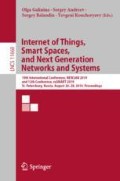Abstract
Exploiting future opportunities and avoiding problematic upcoming events is the main characteristic of a proactively adapting system, leading to several benefits such as uninterrupted and efficient services. In the era when IoT applications are a tangible part of our reality, with interconnected devices almost everywhere, there is potential to leverage the diversity and amount of their generated data in order to act and take proactive decisions in several use cases, smart waste management as such. Our work focuses in devising a system for proactive adaptation of behavior, named ProAdaWM. We propose a reasoning model and system architecture that handles waste collection disruptions due to severe weather in a sustainable and efficient way using decision theory concepts. The proposed approach is validated by implementing a system prototype and conducting a case study.
Access this chapter
Tax calculation will be finalised at checkout
Purchases are for personal use only
Notes
- 1.
- 2.
- 3.
- 4.
- 5.
- 6.
- 7.
References
Anagnostopoulos, T., et al.: Challenges and opportunities of waste management in IoT-enabled smart cities: a survey. IEEE Trans. Sustain. Comput. 2(3), 275–289 (2017). https://doi.org/10.1109/TSUSC.2017.2691049
Anagnostopoulos, T.V., Zaslavsky, A.: Effective waste collection with shortest path semi-static and dynamic routing. In: Balandin, S., Andreev, S., Koucheryavy, Y. (eds.) NEW2AN 2014. LNCS, vol. 8638, pp. 95–105. Springer, Cham (2014). https://doi.org/10.1007/978-3-319-10353-2_9
Bousdekis, A., Papageorgiou, N., Magoutas, B., Apostolou, D., Mentzas, G.: Enabling condition-based maintenance decisions with proactive event-driven computing. Comput. Ind. 100, 173–183 (2018). https://doi.org/10.1016/j.compind.2018.04.019
Engel, Y., Etzion, O., Feldman, Z.: A basic model for proactive event-driven computing. In: Proceedings of the 6th ACM International Conference on Distributed Event-Based Systems - DEBS 2012, pp. 107–118 (2012). https://doi.org/10.1145/2335484.2335496
Faccio, M., Persona, A., Zanin, G.: Waste collection multi objective model with real time traceability data. Waste Manage. 31(12), 2391–2405 (2011). https://doi.org/10.1016/j.wasman.2011.07.005
Johnson, N.E., et al.: Patterns of waste generation: a gradient boosting model for short-term waste prediction in New York City. Waste Manage. 62, 3–11 (2017). https://doi.org/10.1016/j.wasman.2017.01.037
Kaza, S., Yao, L.C., Bhada-Tata, P., Van Woerden, F.: What a Waste 2.0. The World Bank (2018)
Klimova, A., Rondeau, E., Andersson, K., Porras, J., Rybin, A., Zaslavsky, A.: An international Master’s program in green ICT as a contribution to sustainable development. J. Cleaner Prod. 135, 223–239 (2016). https://doi.org/10.1016/j.jclepro.2016.06.032
Mes, M., Schutten, M., Rivera, A.P.: Inventory routing for dynamic waste collection. Waste Manage. 34(9), 1564–1576 (2014). https://doi.org/10.1016/j.wasman.2014.05.011
Perera, C., Zaslavsky, A., Christen, P., Georgakopoulos, D.: Context aware computing for the Internet of Things: a survey. IEEE Commun. Surv. Tutorials 16(1), 414–454 (2014)
Russell, S., Norvig, P.: Artificial Intelligence: A Modern Approach, 3rd edn. Prentice Hall Press, Upper Saddle River (2009)
Vainio, A.M., Valtonen, M., Vanhala, J.: Proactive fuzzy control and adaptation methods for smart homes. IEEE Intell. Syst. 23(2), 42–49 (2008). https://doi.org/10.1109/MIS.2008.33
Vansyckel, S., Schafer, D., Schiele, G., Becker, C.: Configuration management for proactive adaptation in pervasive environments. In: International Conference on Self-Adaptive and Self-Organizing Systems, SASO, pp. 131–140 (2013). https://doi.org/10.1109/SASO.2013.28
Zanella, A., Bui, N., Castellani, A., Vangelista, L., Zorzi, M.: Internet of things for smart cities. IEEE Internet Things J. 1(1), 22–32 (2014). https://doi.org/10.1109/jiot.2014.2306328
Zsigraiova, Z., Semiao, V., Beijoco, F.: Operation costs and pollutant emissions reduction by definition of new collection scheduling and optimization of MSW collection routes using GIS. The case study of Barreiro, Portugal. Waste Manage. 33(4), 793–806 (2013). https://doi.org/10.1016/j.wasman.2012.11.015
Acknowledgement
This research was funded by the PERCCOM Erasmus Mundus Joint Master Program of the European Union [8]. Part of this study has been carried out in the scope of the project bIoTope, which is co-funded by the European Commission under Horizon-2020 program, contract number H2020-ICT- 2015/688203-bIoTope. The research was also supported by ITMO University, Russia and Luleå University of Technology, Sweden.
Author information
Authors and Affiliations
Corresponding author
Editor information
Editors and Affiliations
Rights and permissions
Copyright information
© 2019 Springer Nature Switzerland AG
About this paper
Cite this paper
Fejzo, O., Zaslavsky, A., Saguna, S., Mitra, K. (2019). Proactive Context-Aware IoT-Enabled Waste Management. In: Galinina, O., Andreev, S., Balandin, S., Koucheryavy, Y. (eds) Internet of Things, Smart Spaces, and Next Generation Networks and Systems. NEW2AN ruSMART 2019 2019. Lecture Notes in Computer Science(), vol 11660. Springer, Cham. https://doi.org/10.1007/978-3-030-30859-9_1
Download citation
DOI: https://doi.org/10.1007/978-3-030-30859-9_1
Published:
Publisher Name: Springer, Cham
Print ISBN: 978-3-030-30858-2
Online ISBN: 978-3-030-30859-9
eBook Packages: Computer ScienceComputer Science (R0)

